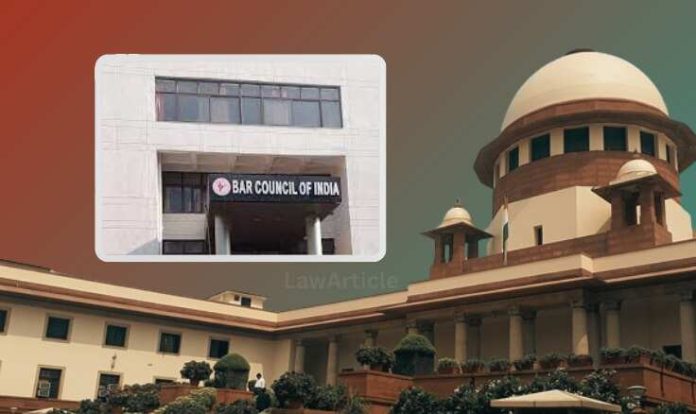Gaurav Kumar v. Union of India
Citation –2024 INSC 558 ( 30 July 2024)
Bench- CJI DR D Y Chandrachud and Justice Jamshed B. Pardiwala
Facts
The Advocates Act of 1961 delineates the procedure for admitting law graduates to the state advocate rolls. Enrollment with a State Bar Council is mandatory to practice law in any court in India. Section 24(1)(f) of the Advocates Act specifies an enrollment fee of six hundred rupees to the SBC and one hundred and fifty rupees to the Bar Council of India (BCI), with reduced fees for Scheduled Caste and Scheduled Tribe candidates.
The petitioner, Gaurav Kumar, lodged a writ petition under Article 32 of the Constitution, contesting the steep enrollment fees levied by SBCs, ranging from Rs. 10,000 to Rs. 50,000. He argued that these high fees are incongruent with the Advocates Act, which outlines a fixed fee structure. The SBCs defended these fees, citing the need to cover various incidental expenses such as library funds, identity card fees, welfare funds, and administrative charges.
Issues
i) Whether the State Bar Councils (SBCs) are justified in charging enrollment fees exceeding the prescribed fees under Section 24(1)(f) of the Advocates Act of 1961 when admitting law graduates to the state rolls.
ii) Whether the payment of other incidental fees can be established as a prerequisite for enrollment.
Judgement
The Supreme Court has determined that State Bar Councils (SBCs) are prohibited from imposing enrollment fees beyond those specified in Section 24(1)(f) of the Advocates Act. The Court has construed the imposition of exorbitant fees as a transgression of the right to equality pursuant to Article 14 and the right to engage in any profession under Article 19(1)(g) of the Constitution. It has been decreed that SBCs are exclusively authorized to collect enrollment fees and stamp duty, precluding the levying of any supplementary fees. This ruling is prospective in its application, thereby absolving SBCs from the obligation to reimburse any surplus fees accrued prior to the date of judgment.
Reason for Decision
The decision was made due to the violation of the right to equality as per Article 14 and the right to practice under Article 19 (1) (g). There was an unreasonable restriction placed on the profession, which resulted in a burden on individuals belonging to lower socioeconomic groups.
Conclusion
The Supreme Court’s verdict underscored the prohibition on State Bar Councils from imposing fees beyond those specified in the Advocates Act. The Court emphasized that such overbearing fees contravene the right to equality under Article 14 and the right to practice under Article 19(1)(g). It mandated strict adherence by the Bar Council of India (BCI) and State Bar Councils (SBCs) to the statutory provisions of the Act. This landmark judgment champions inclusivity in the legal profession, ensuring that economic barriers do not impede individuals from pursuing a career in law in India.
Also Read:
Rights of undertrial prisoners in India
How To Send A Legal Notice In India


